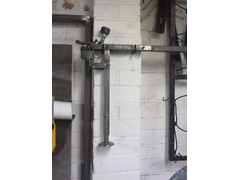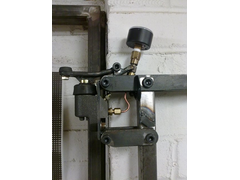 see below
see below 

What is the opinion of this forum on corner weight scales?
I think they are hugely important but relatively unaffordable - at least they are for me.
cheap bathroom scales. thats what everyone will suggest on here  see below
see below 
Corner weighting is essential and gets even more essential if very stiff spring rates are used.
Ive voted 'essential if you are going on track days' although i haev done three since i bought that car (inc replcing rear shocks) and have
yet to get it done.
My housemate at uni (andy lancaster on here) has his locost done when i was using it to compete in the 750mc series and said it made the biggest
diffrent of anything they did to the car. So thats good for me.
They are more expensive than most can buy, but its not outragiously expensive to have it done and there are a few smaller places and members on here
that have them. The cheaper corner weight gauges are another option.
Daniel
if a few people grouped together on they are not that expensive. i recall when i looked they were around £1000-£1600. so divide by 4 so about
£200-£300 each which is about the cost of paying someone else to do it. you would need to be into racing and weighting the car regularly for it to be
worth the cost of ownership.
i did mine with 4 bathroom scales was a bit tricky because they kept turning off after 60 seconds but got it better than it was.
I never had my Indy done and it's the one thing I regret as I really want to know what affect it would've had.
The Des Hamill book "How to setup and modify kit car suspension and brakes" (published by Veloce) details some very simple, low cost methods
for setting a car up including checking the chassis, centrelining, alignment and corner weighting using a jack and a ruler.
I fiddled around following the advice and achieved some noticeable improvements. The real test would have been having it checked on proper quipment
to see how far out I was.
What I'd also be interested to know is how much attention and how accurate tin tops (including "sports" cars) are in this respect. BMW
make great play of their "near perfect weight distribution", but if you drove a stock M3 onto a set of scales how good would it actually
be...?
it makes a huge difference to the car when the weights are right. However the scales cost too much in reality for people to buy thier own. I'd
say get it done proffesionally and if you really want to check it yourself get a corner weight checker (lever and presure guage set-up) as
they're a lot cheaper... takes some practice and patience to use though.
...or you could get a load of cheap scales some planks and run around trying to get the car on and off before the scales freeze and hope they're
all accurate... Should I get my coat? 

adrian
quote:
Originally posted by nick205
What I'd also be interested to know is how much attention and how accurate tin tops (including "sports" cars) are in this respect. BMW make great play of their "near perfect weight distribution", but if you drove a stock M3 onto a set of scales how good would it actually be...?
Going back nearly 30 years when the first generation Rover 200 appeared as the 213 simply a rebadged Honda Ballade but after the initial batch the
Rover assembled cars were found handle better, this puzzled thr Honda quality engineers until Rover engineers told them that on the production line
they were setting the front suspension torsionn bars slightly higher on one side to compensate for asymetrical weight distribution.
Rover were not unique in this Rootes/Chrysler UK used different length front springs on the left and right sides.
That's really interesting BT you are a mine of information!
cheap bathroom scales. thats what everyone will suggest on here see below
thats how my 7 was done
Alternatively - make your own corner gauge
LINKY
If you look at the diagrams linked to this article you'll see that it's quite simple to make - a pressure gauge, brake servo (or similar),
some brake pipe and some metal. Well within the scope of someone who builds their own car.
Remember that you don't need to calibrate the gauge - you just need to know that the reading is the same on each side, whatever the number may
be.
for a lighter car , an axle stand with a long lever on the hub , you can feel the weight , mark the lever so you have the joint on the axle stand
pretty repeatable .
you can feel the weight .
Feel the force Luke
lol.
dont know why i wrote that twice .
nyway to a certain degree , it can actually be done
As mentioned its not hard to make your own although not as good as proper digital scales it defiantly made a difference to the way my car drives.
This was one of last winters projects only cost me £5 for the mini wheel cylinder as i already had the other bits. so very Locost 


Corner Weight gauge


Corner Weight gauge 2
I think the scales I borrow off a mate were around £800 but he may have a had trade discount.
Can't say I've weighed too many production cars but I know the Mazda engineers did a very good job on the RX7.
What surprised me was after doing my V8 conversion and simply rolling the car on the scales with standard suspension. The weight distribution was as
good as my Striker after spending half a day messing around with ride heights!
Yep a bit too much for the average kit car builder but once done it'll take a few changes to put it way off. The first noticeable difference was
stopping one wheel locking first on the Striker. Second was the balance when changing direction quickly from left to right.
There's one option missing in the poll
"A very good idea, and worth the effort for road driving"
My car was much nicer to drive after I'd borrowed a wheel weighing gizmo and spent an hour tweaking the car.
[Edited on 27/10/10 by David Jenkins]
Hi
It's definatly a good thing to have done regardless of whether it's out and out race or road use. BUT if you think it is worth doing and are
taking the handling a bit more seriously you really need to look at the whole package. Having the geometry tweaked to the nearest 0.01mm and the
corner weights adjusted is all well and good but how many are looking at the dampers.
It's no use spending money time and effort on the setup if you ignore the dampers which have more say in the overall handling than the corner
weights or the basic geometry. Having an imbalance of 50 odd Lb across the car on compression and 100Lb in rebound will leave the car in a situation
that will make it impossible to have good control and confidence in handling whilst cornering. You can't really just look at one thing when
setting the car up you need to take everything into consideration.
Cheers Matt
I'm going to go against the grain here. I really think corner weighting is a bad idea on most 7 cars, but bear with me...
I think corner weight is a 10/10ths thing. You will only really benefit from it when you are pushing the car seriously hard.
However, so much confidence can be found in a car by paying careful attention to literally everything else. Spring rates, camber, alignment, ride
heights, ARB stiffness, etc...
The trouble is, most people build their car, take it to be set up and corner weighted, and then never touch the suspension again, because they
don't want to change anything and mess up their corner weighting (typically the most expensive part of a setup).
It's for this reason I think it is bad - not because I think it's ineffective.
You can end up with 2 scenarios:
CAR A): Car has NOT been corner weighted, but everything else is exactly how I want it as a result of testing and tweaking constantly to come up with
a package which works well for me.
CAR B): Car has been taken to a specialist for an initial setup and corner weighting session.
I'd take car A every time, because I would find so much more confidence in the chassis. Then of course you can always have it corner weighted at
a later date.
Just my opinion though.
In my case, I thought the car was fine until I sorted the corner weights - then it felt much nicer! It just felt more... settled, balanced,
whatever.
Sorting the shocks & springs would undoubtedly make things much better - but at least corner weighing is a start.
Hi
So looking at the poll it seems that most think that corner weighting is a good idea but too expensive.
Just curious as to what people think a realistic price should be for 1. Corner weighting. And 2. For a full suspension setup. ??
Cheers Matt
i think the £200 you charge(I think that's correct!?) Is a fair price with the other bits that are done at the same time. This seems to be the
going rate too.
I understand lots of cars can be set-up tweaked quite quickly but some can take a full day.
Difficult to say Matt!
I would think an hourly rate really, as it depends on the car, type of adjusters fitted, when they were last moved, how near or far from setup the car
is etc etc.
I'd say £200 was fair enough, assuming a typical setup requiring a bit of work